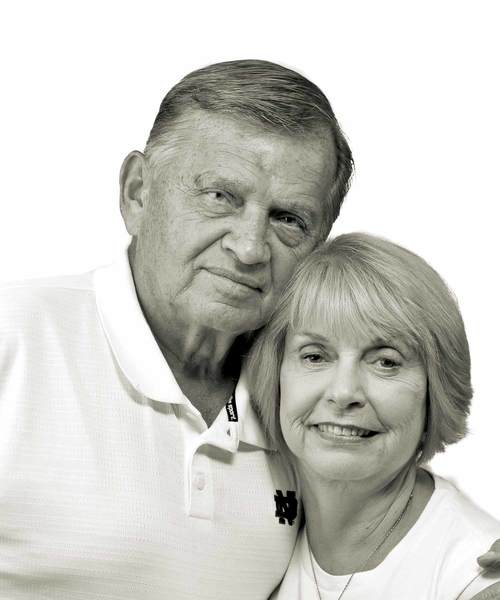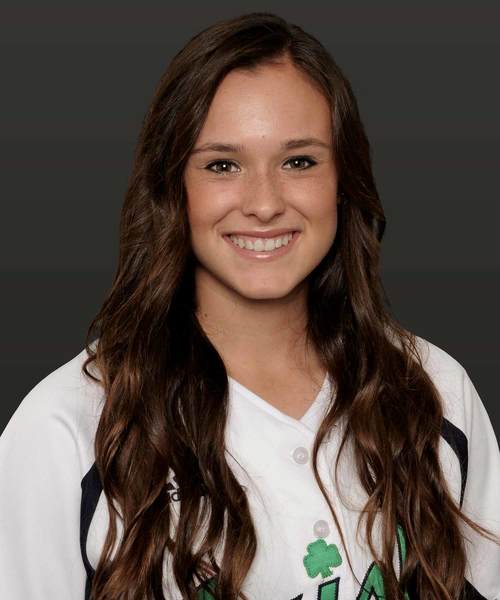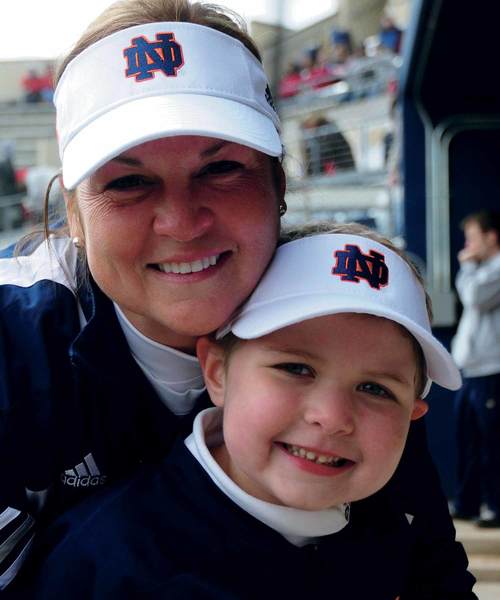
Paul & Linda Demo
Parents of Irish softball player deal with tragedy in memorializing their daughter
Even for the Windy City, the swirling currents of air in Chicago were extreme on March 2, 2002, Linda Demo remembers. It was the day tragedy fell from the sky.
Linda, her daughter Melissa Cook (a 1994 Notre Dame graduate), her niece Jill Nelson, and Jill’s mother were in high spirits despite the storm. The four had just completed a shopping expedition and were in the car headed to Melissa’s 30th birthday party where a hundred friends were waiting to celebrate.
At the corner of Michigan and Chestnut, Melissa, who was driving, paused and waved a pedestrian across the street in front of the car. “Her last act was one of kindness” Linda says, “and it cost her life.” In the next instant, a massive piece of scaffolding tore from the John Hancock Center, whipped around the corner in the wind and landed on the car, killing both young women and injuring their mothers.
That last act of kindness was typical of Melissa, Linda Demo, says. “She was everyone’s best friend.” Even as a girl, Melissa would help any friend who was in trouble, financially or otherwise. During high school, she regularly cut the grass for one of her elderly teachers and, as a young accountant, she gave a dollar every day to a homeless man who waited for her largesse on her route to work. At Lyons Hall, Melissa’s Notre Dame dorm, so many young women claimed her as their best friend that her dorm-mates used to call her “Besty.”
Those best friends, along with other members of the Notre Dame community, gathered around in the agonized days after Melissa’s death. Her Notre Dame friends in Chicago “circled the wagons and took care of us,” Paul Demo, Melissa’s stepfather, says. With Linda hospitalized briefly following the accident, the Domers did whatever needed to be done, including cleaning out Melissa’s apartment.
“It was like we got a bunch of new children,” Linda says. The first Mother’s Day after the accident was “amazing,” with cards and gifts arriving “from coast to coast.” Christmas was the same, Linda says. “They never forgot a holiday!” In the ensuing months, 10 of Melissa’s “best friends” from Lyons Hall planted a tree there in her honor.
But once the immediate tragedy is past, how does one cope with the loss of an only child?
Linda and Paul Demo use words like “dark” and “silent” to describe the days following Melissa’s burial. On a particularly dark day, a month or two after the event, the two found the strength to go to a cousin’s house and offer to put their three children through college. This generosity marked the beginning of a pattern: by looking at Melissa’s life, her values and the things that enriched her, the Demos found a way to memorialize their daughter by enriching other young lives.
Melissa’s time on earth was “jam-packed with everything you could do in 30 years,” Linda Demo, says. A bright, spirited child, Melissa grew up in Merrillville, Ind., and showed an early aptitude for both sports and the math that would lead her to a career in accountancy. In high school, Melissa was captain of not one but three sports: volleyball, softball and basketball. She quit the volleyball team in protest, however, when the coach would not allow her to also play Powder Puff football, a cause that represented for her the importance of women’s sports. Melissa’s first choice for college was Notre Dame, and a softball scholarship ensured that she would continue to play at third base and as catcher. Melissa led the team in triples as a freshman, and found herself filling in as catcher for the conference tournament, helping the team bring home a victory.
Adventure called Melissa in her junior year, and she joined a group of 25 students heading to Fremantle in western Australia for Notre Dame’s brand new study-abroad program. Upon graduation a year and half later, Melissa was hired by a Chicago accounting firm that specialized in unions and frequently assigned her work with the Teamsters. Once there, Melissa proved so valuable to the Teamsters Union Local 786 that a position as comptroller of union benefits was created for her, a position she held until the time of her death.
Following the accident in 2002, a lawsuit was inevitable, Paul Demo says; 10 people had been hurt or killed by the massive debris, including the pedestrian Melissa had waved across the street. This woman suffered a breakdown after she turned and saw young lives snuffed out while hers had been spared, and Linda Demo encouraged her to become part of the legal action. The Demos chose another member of the Notre Dame family, Thomas Demetrio (a ’69 graduate), to represent them, and as the trial approached, the Demos’ first concern was that the truth be told about the equipment and decisions that had resulted in their only child’s death.
Once a settlement was reached with the owners of the skyscraper and other companies in 2006, the Demos’ prime concern was that the money be used to improve other young lives in a way that would preserve Melissa’s memory. “We never thought of this as our money,” the Demos say. “This is Melissa’s money; it’s sacred money.” And that money would result in two major initiatives.
In July of 2006, Notre Dame announced a $3 million dollar gift from Paul and Linda Demo for the construction of the Melissa Cook Stadium. The brick softball stadium would feature locker rooms for home and visiting teams, heated dugouts, training rooms, office space and advanced technology in field drainage and lighting.
Why a softball stadium? “Because we wanted to keep her spirit alive,” Linda Demo says, and participating in sports had been an integral part of that spirit. “She was passionate about women’s athletics,” Linda continues, and women’s teams in the early 1990s didn’t have the kind of locker rooms and changing areas that were available to the men. The Demos wanted to fund a facility that would give women equal access to equipment and amenities.
The groundbreaking for the stadium coincided with celebration of the 35th anniversary of women at Notre Dame, and Linda was asked to speak at the celebratory luncheon. She remembers that former Notre Dame President Rev. Theodore M. Hesburgh, C.S.C., was seated next to the podium and gave her a “thumbs up” when she stood to speak and a big hug after she finished. “You met Melissa,” Linda whispered to him. “She came to see you once.”
“Yes, Linda,” he said, “I know.” Father Hesburgh subsequently said Mass and had dinner with the Demos, and Linda later went to him for spiritual advice. “He’s been a rock,” she says. The stadium, which bears Melissa’s name, was completed and opened for the Fighting Irish softball season of 2008.
Reflecting on the importance of her college years in Melissa’s life, the Demos chose to use another portion of the settlement to fund the Melissa Cook Foundation, which each year seeks to lift one or two students out of the cycle of poverty that Linda Demo observed in her years as a teacher in northwest Indiana.
“People in poor neighborhoods acted as if there was a fence around their neighborhood that they couldn’t climb,” she explains, and the Foundation aims to provide the necessary ladder. The Demos are convinced that campus life, as well as classroom instruction, is part of an education that is transformative. They remember that Melissa so enjoyed the totality of her Notre Dame experience that she frequently invited a friend who had commuted to her college classes to come visit and share campus life. Therefore, the Foundation scholarships include not just tuition, but also room and board, so that the students can live full time on an Indiana campus. In addition to the Demos and one of Melissa’s cousins, the board of the Foundation includes four of Melissa’s 1994 Notre Dame classmates: Julie McMahon, Lynne Hartzler, Kelly Dee and Andrea Callanen.
The motto of the Melissa Cook Foundation expresses the way that Paul and Linda Demo believe their daughter lived: “Every little kindness counts.”

